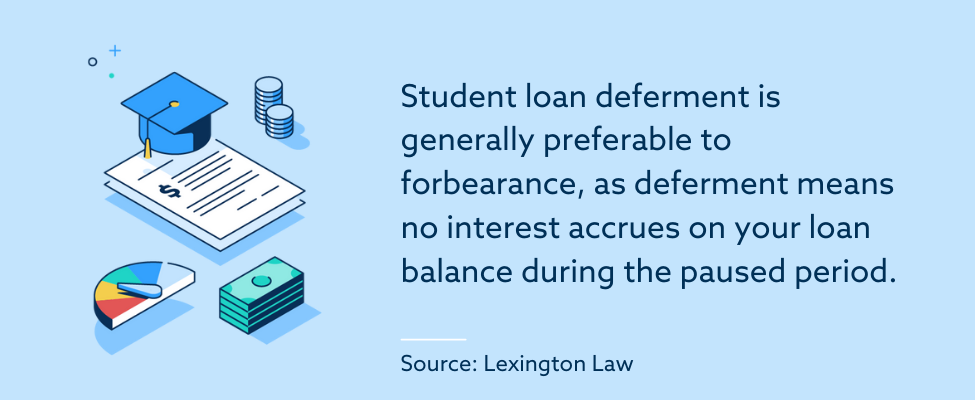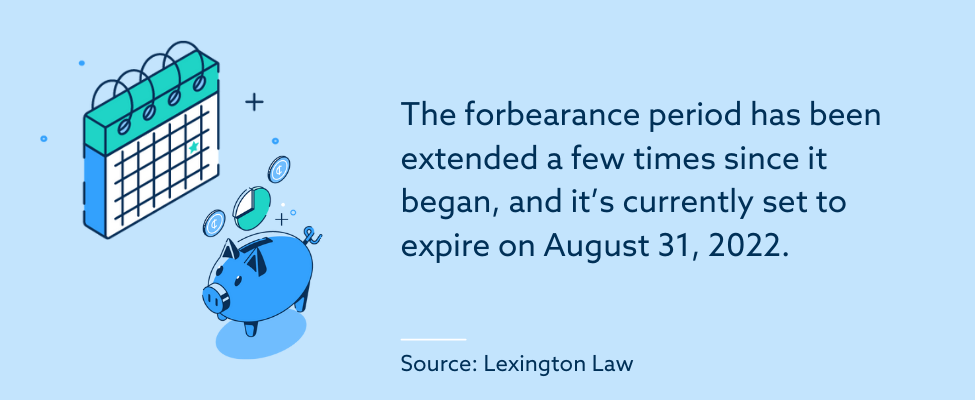
Student loan deferment and forbearance are loan modification options that shouldn’t directly impact your credit, but they may have an indirect effect.
The information provided on this website does not, and is not intended to, act as legal, financial or credit advice. See Lexington Law’s editorial disclosure for more information.
Considering deferring or placing your loans in forbearance due to financial struggles related to coronavirus (COVID-19)? Skip directly to our breakdown on how the CARES Act impacts you, your student loans and your credit—or read on to learn more about how pausing your student loans typically works.
Update: On August 24, 2022, President Biden announced student loan forgiveness of up to $10,000 for qualified borrowers and up to $20,000 for qualifying Pell Grant recipients. Federal student loan payments will also remain paused through December 31, 2022. Further details are to be announced in the coming weeks.
Going to college has become increasingly more expensive over the last few decades, making more and more students reliant on student loans. In 2003, the national student loan debt balance sat at $0.33 trillion; by 2021, that number had snowballed to nearly $1.75 trillion. The average federal student loan balance is $37,014. If you include private student loans, the average balance for an American student may be as high as $40,904.
As the COVID-19 pandemic swept the world in 2020, many individuals were financially impacted. By September 2020, 25 percent of Americans reported that they or someone in their household had lost their job due to the pandemic. Unsurprisingly, one in four Americans also reported having difficulties paying their bills since the pandemic, including student loans.
The U.S. government quickly recognized the nation’s need for financial help and introduced programs like stimulus paychecks, pauses on mortgage foreclosures and student loan deferment and forbearance.
Student loan deferment and forbearance can help people who might not be able to make their payments. But especially now, many are wondering how student loan deferment and forbearance affect credit. The good news is that these options shouldn’t directly impact a borrower’s credit, but make sure you understand the specifics if you’re considering either of these loan modifications.
What is student loan deferment?
Student loan deferment is an agreement between a lender and a borrower that allows the student to reduce or pause payments for a predetermined length of time. During this time, you can defer payments of your balance, interest or both on your student loans.
Usually, student loan deferment is challenging to get. It’s saved for people who can’t work, have continued additional studies or have specific types of jobs. Student loan deferment may be granted if you:
- Are on temporary total disability
- Are in a rehabilitation training program
- Are on parental leave
- Are unemployed
- Are in medical-school residency
- Are in a full-time graduate fellowship program
- Are enrolled at least half-time in an eligible school
- Have a job in the public service, such as the Armed Forces or Peace Corps
- Are teaching in a designated area or a school system with a shortage of teachers
What is student loan forbearance?
Student loan forbearance is a temporary pause or reduction on student loan payments—usually mandated by the government. Therefore, student loan forbearance is generally only applicable to federal student loans, not private loans.
Student loan deferment is generally preferable to forbearance, as deferment means no interest accrues on your loan balance during the paused period.
Individuals seeking forbearance have to apply with their lender. Often student loan forbearance is only granted to those who can prove they’re going through a financial hardship and can’t make their loan payments.

There are two main types of forbearance: general and mandatory.
General forbearance is when you apply and your lender holds the authority to approve or deny your request. Typical reasons to apply for general forbearance include financial challenges, significant medical debt, unemployment and sudden drastic drops in income.
If you’re approved for general forbearance, you typically get 12 months of reduced or paused payments with interest still accruing. You can apply for general forbearance more than once, but many lenders limit a total of three years of forbearance over the life of a loan.
The other type of forbearance is mandatory, meaning federally backed student loans must accept the forbearance application from all qualifying individuals. Qualifications for mandatory forbearance are:
- Your monthly loan payment is more than 20 percent of your monthly gross income
- You’re enrolled in a medical or dental internship or residency program
- You’re serving in a qualifying volunteer-based program, such as AmeriCorps
- You’re a teacher who meets the qualifications for student loan forgiveness
- You serve in the National Guard
- You’re enrolled in the Department of Defense’s loan repayment program
Do deferment and forbearance affect your credit?
The good news is that student loan deferment and forbearance don’t directly impact your credit. But they can have indirect effects.
On the one hand, your credit should be protected from the negative impact of late payments you might have been making if your loan wasn’t in deferment or forbearance, which is good. However, there can still be some indirect impacts:
- If you’re applying for a loan like a mortgage, your lender will see you’re in forbearance and still account for your loan. For example, they may take 1 percent of your total loan balance and estimate that to be your future student loan payment.
- You may get accustomed to not making payments on your loan, and once forbearance or deferment is over, you may miss or make late payments, which will impact your credit.
- Missed or late payments prior to your forbearance or deferment period will remain on your credit report and continue to impact your credit score.
Additionally, it’s essential to know if your loan forbearance comes with accruing interest, as it typically does (the COVID-19 loan forbearance is an exception). If so, it could increase your amount of unpaid debt, which could negatively affect your credit.
Lastly, make sure you start making payments in accordance with the loan agreement as soon as your deferment or forbearance period has ended. A single late or missed payment can be added as a negative item to your credit report and impact your credit score.
Student loans during the COVID-19 pandemic
During COVID, the government implemented several economic programs to help individuals through the financial struggles that came with the pandemic. In March 2020, the U.S. government passed the $2.2 trillion stimulus bill called the Coronavirus Aid, Relief and Economic Security Act (CARES Act).
Included within this act was the decision to issue forbearance on all eligible loans, pausing student loan payments. The forbearance period has been extended a few times since it began, and it’s currently set to expire on August 31, 2022. With this latest extension, the U.S. Department of Education said, “The extension will provide additional time for borrowers to plan for the resumption of payments, reducing the risk of delinquency and defaults after restart.”

Unlike most loan forbearance situations, the COVID-19 student loan forbearance came with 0 percent interest accruing. Additionally, it stopped all collections on defaulted loans.
Most federal loans are eligible for the COVID forbearance program, but you can determine your eligibility by contacting your loan provider.
Unfortunately, if you have private student loans, your lender is under no legal obligation to offer you forbearance. Still, many private lenders have chosen to provide some form of relief to borrowers during the pandemic, such as options to reduce payments or pause payments for a few months. Your best option is to contact your private lender directly and ask if there are any incentives you can take advantage of during this financially challenging time.
If you’re financially secure, you should consider making your student loan payments anyway. As the current COVID student loan forbearance comes with 0 percent interest, any payments you make will go entirely to the loan’s principal and decrease your overall balance.
However, there are some situations where making these additional payments isn’t worthwhile. For example, the U.S. Department of Education has said each suspended payment qualifies as a monthly payment for the Public Service Loan Forgiveness Program (PSLF). So, those pursuing PSLF can take advantage of these months and progress toward their 120 monthly payments goal without parting with any money.
Ultimately, the decision to pay or not pay your loans during forbearance is personal. You should do your research and fully understand which option presents the best benefits for you.
Credit help for those with student loans
Student loan debt can be overwhelming and difficult to manage. It’s not uncommon for students to feel burdened by their debt and make decisions that significantly impact their credit. The good news is that even when mistakes happen, you can recover from them.
Lexington Law Firm could help individuals with student loan credit repair. Our credit repair consultants will help you enroll in our Student Loan Focus Track, which comes with identity protection, cease and desist assistance, inquiry assists and creditor intervention. You can take back control of your credit today—sign up to get started.
Note: Articles have only been reviewed by the indicated attorney, not written by them. The information provided on this website does not, and is not intended to, act as legal, financial or credit advice; instead, it is for general informational purposes only. Use of, and access to, this website or any of the links or resources contained within the site do not create an attorney-client or fiduciary relationship between the reader, user, or browser and website owner, authors, reviewers, contributors, contributing firms, or their respective agents or employers.
